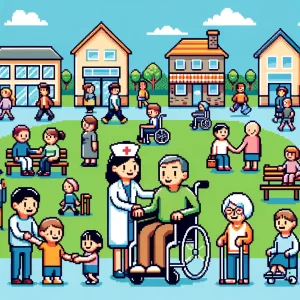
Worldwide Lessons to Advance Health Equity
The COVID-19 pandemic has highlighted our interconnectedness and the urgent need for global learning. This concept, where high-income countries learn from the innovative health solutions of low- and middle-income countries, has gained momentum. The Global Learning for Health Equity (GL4HE) Network, supported by the Robert Wood Johnson Foundation, explored this in a three-part webinar series in December 2021. Their findings, now detailed in a recent paper, show how we can learn from each other to address health inequities.
The Power of Global Learning
Global learning isn’t new, but the pandemic has accelerated its acceptance. This practice involves adapting successful health interventions from one country to another, especially from low- and middle-income countries (LMICs) to high-income countries (HICs). It’s about recognizing that solutions to health problems can come from any corner of the globe, and often, those from resource-limited settings offer simple, effective, and innovative approaches.
Historical Examples
One iconic example is China’s 1960s Barefoot Doctors program. Rural farmers were trained to provide basic healthcare services, which inspired community health worker programs worldwide. Similarly, Colombia’s Ciclovía, promoting physical activity by closing streets to cars, has been adopted in many U.S. cities like Los Angeles and Detroit.
Learning from COVID-19 Responses
The pandemic showed stark health inequities in the U.S. while other countries managed better through equitable measures. For instance, Ghana and Brazil’s favelas demonstrated community-driven responses that effectively controlled the virus. Senegal’s rapid response earned it high praise for managing COVID-19, showcasing that LMICs have valuable lessons for the world.
The GL4HE Network’s Mission
The GL4HE Network, established before the pandemic, aims to understand and promote global learning to advance health equity in the U.S. Through webinars, research, and community collaborations, they strive to adapt health equity interventions from around the world to local contexts.
Overcoming Barriers and Biases
Global learning faces challenges, including biases and limited funding. There’s a tendency to overvalue European and HIC innovations while undervaluing LMICs. Overcoming this requires humility and openness to learning from diverse sources.
Success Stories and Practical Insights
The webinar series revealed practical insights and success stories. For instance, Rwanda’s success in vaccinating 90% of its capital’s population was due to leadership’s willingness to learn globally and high trust in the health sector. Such stories provide actionable lessons for improving trust and health outcomes in the U.S.
Dr. Agnes Binagwaho from the University of Global Health Equity shared, “Improving trust in health systems is a significant opportunity for global learning.”
Best Practices for Global Learning
- Context Matters: Understanding the historical, political, and cultural contexts is crucial. What works in one country may need adaptation to succeed elsewhere.
- Addressing Biases: Combatting biases involves recognizing and valuing expertise from LMICs and being open to learning from diverse sources.
- Funding Considerations: Flexible funding mechanisms can support global learning projects by allowing for necessary adaptations based on community needs.
- Bidirectional Partnerships: Ensuring mutual benefits and learning opportunities for all involved communities is key to successful global learning.
- Community Engagement: Authentic engagement with communities and inclusion of their voices in all stages of program development is essential.
- Multidisciplinary Approach: Collaboration across sectors ensures comprehensive solutions to health equity challenges.
A Call to Action
The insights from the GL4HE Network’s webinars highlight the transformative potential of global learning. By adopting and adapting health solutions from around the world, we can make significant strides in addressing health inequities in the U.S.
Join the Conversation
What innovative health solutions from other countries do you think could benefit your community? How has the COVID-19 pandemic changed your perspective on learning from other countries?
Share your thoughts in the comments below or on social media using #GlobalLearningHealthEquity.
Join the Community – Get Your Weekly Public Health Update!
Be a health leader! Subscribe for free and share this blog to shape the future of public health together.



